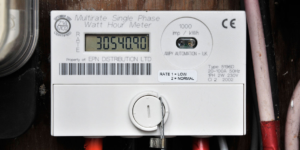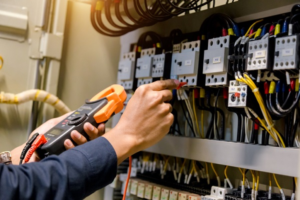An electricity meter is the device that measures the amount of electricity a residency or business uses. There are several types of electricity meters such as smart meters. Depending on your business electricity plan you might be required to have a smart meter or another specific meter. The type of meter you have might impact the cost of your business electricity.
Types Of Electricity Meters

Electricity meters are devices used to measure and record the amount of electricity consumed in a home or business. There are several different types of electricity meters, each with their own unique features and capabilities.
- Flat-rate meters are the traditional type of electricity meter. They record your electricity consumption from the moment the meter is installed or last reset. Technicians need to visit the meter to check and record the data. Further, you will be billed based on the differences between consecutive readings.
- Interval electricity meters are a newer type of meter that records your electricity electronically, rather than electromagnetically. These meters record the energy in half-hour intervals, allowing for more accurate and detailed billing.
- Solar electricity meters are specialised meters that are paired with a solar system to measure both the electricity produced and used. These meters are useful for tracking the efficiency of a solar system. Moreover they can identify opportunities to save on electricity costs.
- Finally, there are smart meters, which are now the standard when new meters are installed. These meters measure electricity digitally and calculate both when the electricity was consumed and how much. Smart meters are a convenient and efficient way to track electricity usage and to identify opportunities to reduce energy costs.
Electricity Rates With Different Meters
Different electrical rates can require different types of electrical meters. For example, flat-rate electricity plans charge a fixed price for a set amount of electricity consumption, regardless of when it is used. In this case, a flat-rate meter would be used to measure the total amount of electricity consumed. On the other hand, time-of-use electricity plans charge different rates depending on the time of day that the electricity is used. In this case, an interval electricity meter would be used to measure the amount of electricity consumed during different time periods.
Smart meters can also be programmed to track and record electricity usage according to different rates. This makes them a flexible and convenient option for tracking electricity consumption under a variety of rate plans. To determine which electricity plan is best for you, you should contact electricity brokers at Power Maintenance in Melbourne for a free initial consultation and further guidance.
How To Change You Electricity Meter

Once you have determined which meter is best for you depending on what electricity rate best suits you, you can change you electricity meter. The process for changing an electrical meter will vary depending on the specific type of meter you have and the regulations in your area. In some cases, you may be able to request a meter upgrade or change directly from your electricity provider. In other cases, you may need to hire a licensed electrician to perform the work. It is important to follow all local regulations and safety guidelines when changing an electrical meter. This ensures the safety of you and your property. If you require assistance you can contact Power Maintenance.
Power Maintenance are specialised electricity brokers that can help you with electrical metering and other electricity queries. Contact us for a free quote.
